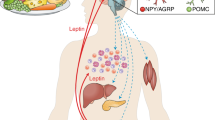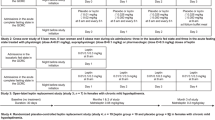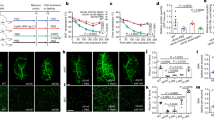Abstract
The adipocyte-specific hormone leptin, the product of the obese (ob) gene,regulates adipose-tissue mass through hypothalamic effects on satiety and energy expenditure1,2,3,4. Leptin acts through the leptin receptor, a single-transmembrane-domain receptor of the cytokine-receptor family5,6,7. In rodents, homozygous mutations ingenes encoding leptin1 or the leptin receptor6 cause early-onsetmorbid obesity, hyperphagia and reduced energy expenditure. These rodents also show hypercortisolaemia, alterations in glucose homeostasis, dyslipidaemia, and infertility due to hypogonadotropic hypogonadism8. In humans, leptin deficiency due to a mutation in the leptin gene is associated with early-onset obesity9. Here we describe a homozygous mutation in the human leptin receptor gene that results in a truncated leptin receptor lacking both the transmembrane and the intracellular domains. In addition to their early-onset morbid obesity, patients homozygous for this mutation have no pubertal development and their secretion of growth hormone and thyrotropin is reduced. These results indicate that leptin is an important physiological regulator of several endocrine functions in humans.
This is a preview of subscription content, access via your institution
Access options
Subscribe to this journal
Receive 51 print issues and online access
$199.00 per year
only $3.90 per issue
Buy this article
- Purchase on Springer Link
- Instant access to full article PDF
Prices may be subject to local taxes which are calculated during checkout



Similar content being viewed by others
References
Zhang, Y. et al. Positional cloning of the mouse obese gene and its human homologue. Nature 372, 425–432 (1994).
Halaas, J. L. et al. Weight reducing effects of the plasma protein encoded by the obese gene (ob). Science 269, 543–546 (1995).
Pelleymounter, M. A. et al. Effects of the obese gene product on body weight regulation in ob/ob mice. Science 269, 540–543 (1995).
Campfield, L. A., Smith, F. J., Guisez, Y., Devos, R. & Burn, P. Recombinant mouse OB protein: evidence for a peripheral signal linking adiposity and central neural networks. Science 269, 546–549 (1995).
Tartaglia, L. A. et al. Identification and expression cloning of a leptin receptor, OB-R. Cell 83, 1263–1271 (1995).
Lee, G. H. et al. Abnormal splicing of the leptin receptor in diabetic mice. Nature 379, 632–635 (1996).
Vaisse, C. et al. Leptin activation of Stat3 in the hypothalamus of wild-type and ob/ob mice but not db/db mice. Nature Genet. 14, 95–97 (1996).
Coleman, D. L. Obese and Diabetes: two mutant genes causing diabetes-obesity syndromes in mice. Diabetologia 14, 141–148 (1978).
Montague, C. T. et al. Congenital leptin deficiency is associated with severe early-onset obesity in humans. Nature 387, 903–907 (1997).
Clément, K. et al. Association of poorly controlled diabetes with low serum leptin in morbid obesity. Int. J. Obes. 21, 556–561 (1997).
Liu, C. et al. Expresison and characterization of a putative high affinity human soluble leptin receptor. Endocrinology 138, 3548–3554 (1997).
Houseknecht, K. L. et al. Evidence for leptin binding to proteins in serum of rodents and humans: modulation with obesity. Diabetes 45, 1638–1643 (1996).
Diamond, F. B. et al. Demonstration of a leptin binding factor in human serum. Biochem. Biophys. Res. Commun. 233, 818–822 (1997).
Chehab, F. F., Lim, M. E. & Lu, R. Correction of the sterility defect in homozygous obese female mice by treatment with the human recombinant leptin. Nature Genet. 12, 318–320 (1996).
Chehab, F. F., Mounzih, K., Lu, R. H. & Lim, M. E. Early onset of reproductive function in normal female mice treated with leptin. Science 275, 88–90 (1997).
Ahima, R. S., Dushay, J., Flier, S. N., Prabakaran, D. & Flier, J. S. Leptin accelerates the onset of puberty in normal female mice. J. Clin. Invest. 99, 391–395 (1997).
Mantzoros, C. S., Flier, J. S. & Rogol, A. D. Alongitudinal assessment of hormonal and physical alterations during normal puberty in boys. Rising leptin levels may signal the onset of puberty. J. Clin. Endocrinol. Metab. 82, 1066–1070 (1997).
Clayton, P. E. et al. Serum leptin through childhood and adolescence. Clin. Endocrinol. 46, 727–733 (1997).
Bernini, G. P. et al. Impaired growth hormone response to insulin-induced hypoglycemia in obese patients: restoration blocked by ritanserin after fenfluramine adminsitration. Clin. Endocrinol. 32, 453–459 (1990).
Thissen, J. P., Ketelslegers, J.-M. & Underwood, L. Nutritional regulation of the insulin-growth factors. Endocr. Rev. 15, 80–101 (1994).
Vignolo, M., Naselli, A., Di Battista, E., Mostert, M. & Aicardi, G. Growth and development in simple obesity. Eur. J. Pediatr. 147, 242–244 (1988).
Bray, G. A. & York, D. A. Hypothalamic and genetic obesity in experimental animals: an autonomic and endocrine hypothesis. Physiol. Rev. 59, 719–790 (1979).
Tannenbaum, G. S., Lapointe, M., Gurd, W. & Finkelstein, F. A. Mechanism of impaired growth hormone secretion in genetically obese Zucker rats: roles of growth hormone factor and somatostatine. Endocrinology 127, 3080–3095 (1990).
Carro, E., Senaris, R., Considine, R. V., Casanueva, F. F. & Dieguez, C. Regulation of in vivo growth hormone secretion by leptin. Endocrinology 138, 2203–2206 (1997).
Ahima, R. S. et al. Role of leptin in the neuroendocrine response to fasting. Nature 382, 250–252 (1996).
Björntorp, P. Body fat distribution, insulin resistance, and metabolic diseases. Nutrition 13, 795–803 (1997).
Hummel, K. P., Coleman, D. L. & Lane, P. W. The influence of genetic background on expression of mutations at the diabetes locus in the mouse C57BL/KsJ and C57BL/6J strains. Biochem. Genet. 7, 1–13 (1972).
Coleman, D. L. & Hummel, K. P. The influence of the genetic background on the expression of the obese (ob) gene in the mouse. Diabetologia 9, 287–293 (1973).
Echwald, S. M. et al. Amino acid variants in the human leptin receptor — lack of association to juvenile onset obesity. Biochem. Biophys. Res. Commun. 233, 248–252 (1997).
Hardouin, S. et al. Molecular forms of serum insulin-like growth factor (IGF) binding proteins in man: relationships with growth hormone and IGF1s and physiological significance. J. Clin. Endocrinol. Metab. 69, 1291–1301 (1989).
Acknowledgements
This work was supported by the French Ministère de l'Education, de la Recherche etde la Technologie, the Direction de la Recherche Clinique/Assistance Publique-Hopitaux de Paris, Programme Hospitalier de Recherche Clinique and the Institut de Recherche Endocrinienne et Métabolique. We thank E. R. Serra, D. Pepin, S. Carrera, P. Boutin., L. Perrin, J. Le Fourn and Y. Le Bihan for technical help; J. Di Santo for critical reviewing of the manuscript; and the patients and their families for their cooperation. Informed personal and parental consents were obtained and ethical permission was granted by the local ethics committee (CCPPRB, Hôtel-Dieu, Paris).
Author information
Authors and Affiliations
Corresponding author
Rights and permissions
About this article
Cite this article
Clément, K., Vaisse, C., Lahlou, N. et al. A mutation in the human leptin receptor gene causes obesity and pituitary dysfunction. Nature 392, 398–401 (1998). https://doi.org/10.1038/32911
Received:
Accepted:
Issue Date:
DOI: https://doi.org/10.1038/32911
This article is cited by
-
Determinants of obesity in Latin America
Nature Metabolism (2024)
-
Leptin receptor gene deficiency minimally affects osseointegration in rats
Scientific Reports (2023)
-
Position statement on nutrition therapy for overweight and obesity: nutrition department of the Brazilian association for the study of obesity and metabolic syndrome (ABESO—2022)
Diabetology & Metabolic Syndrome (2023)
-
Congenital leptin and leptin receptor deficiencies in nine new families: identification of six novel variants and review of literature
Molecular Genetics and Genomics (2023)
-
Rare genetic forms of obesity in childhood and adolescence, a comprehensive review of their molecular mechanisms and diagnostic approach
European Journal of Pediatrics (2023)
Comments
By submitting a comment you agree to abide by our Terms and Community Guidelines. If you find something abusive or that does not comply with our terms or guidelines please flag it as inappropriate.



